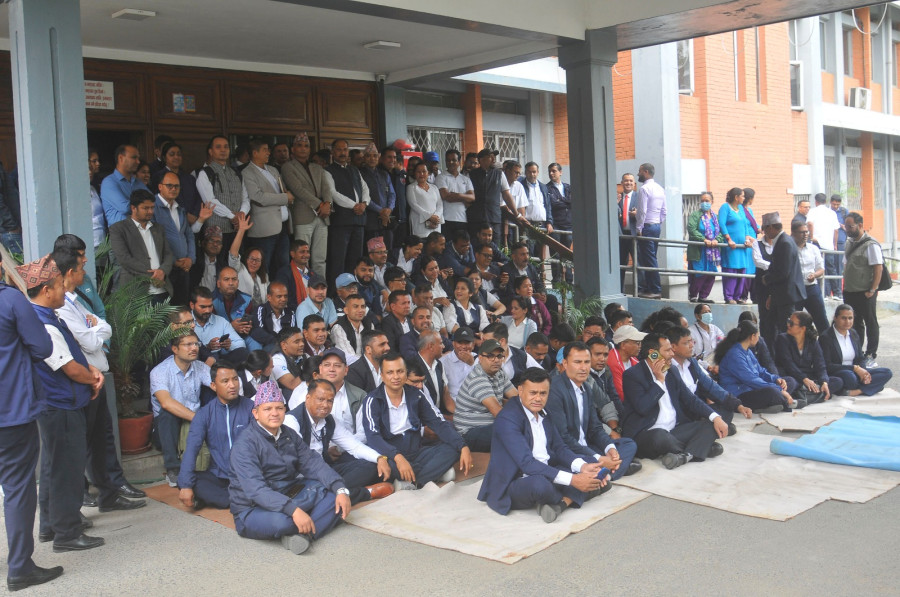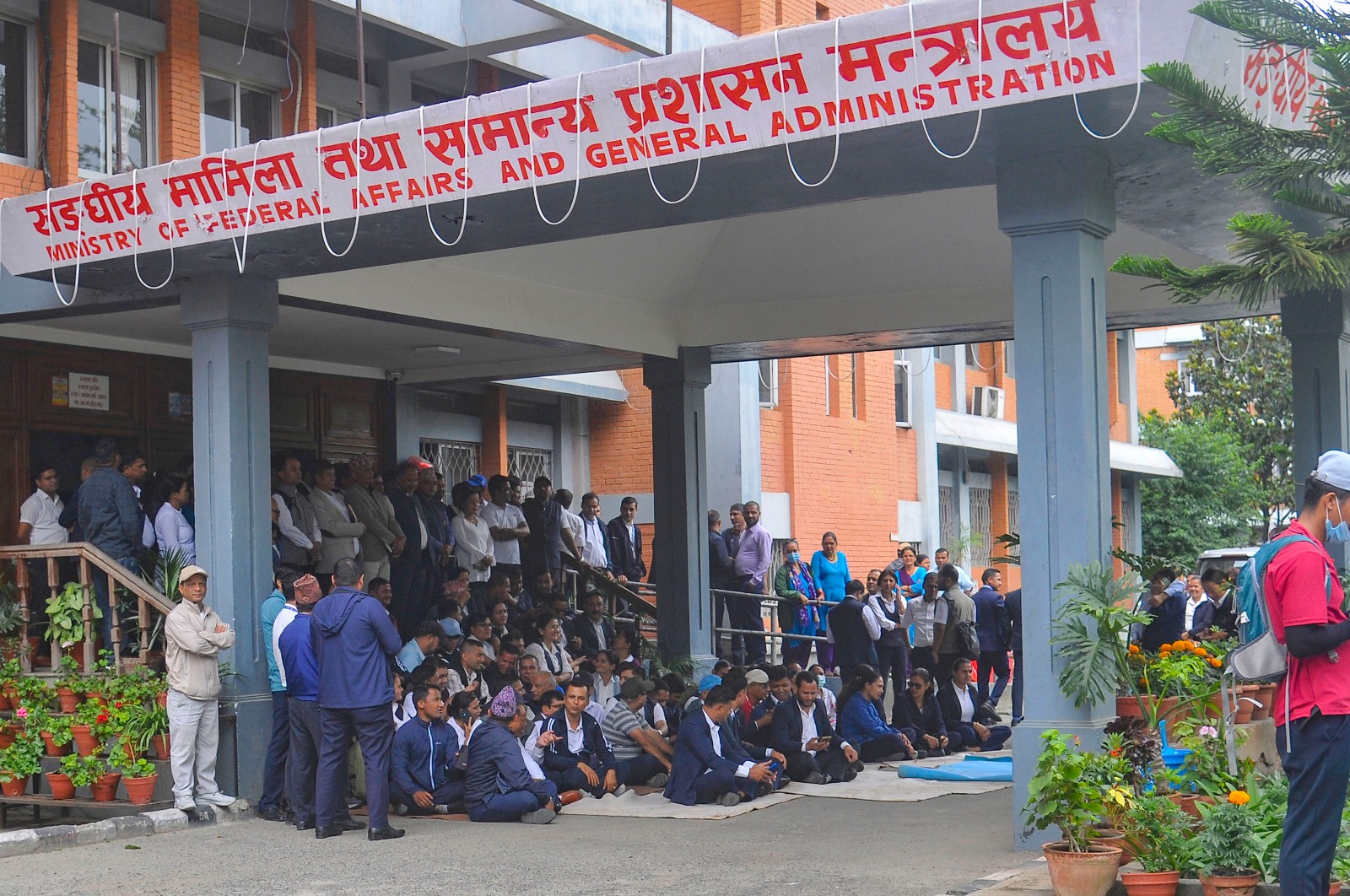National
Government employees up in arms against federal civil service bill
On Sunday, agitating civil servants wore black armbands while working at their respective offices.
Purushottam Poudel
Civil servants across the country have launched a new phase of indefinite protest demanding an employee-friendly federal civil service act.
They resumed their protest, accusing the State Affairs Committee of the House of Representatives of not accommodating their demands while making amendments to the Federal Civil Service Act. The House committee finalised the draft bill on its part last month. But the committee chair is yet to table the bill in the plenary.
Giving continuity to their protest on Sunday, agitating civil servants wore black armbands while working at their respective offices.
The protest programme was called by the Movement Directive Committee of the Joint National Trade Union Network, a coalition of trade unions affiliated with various political parties.
Stating that some of the provisions included in the bill can negatively impact their promotions and career development, the agitating civil servants have demanded that such clauses be removed before it is passed from the full House. The bill becomes law once it is passed by the House of Representatives and the National Assembly and approved by the President.
The agitating civil servants want to correct it before that.
In particular, they are dissatisfied with the absence of a fixed tenure for the post of additional secretary, which was added in the latest revision by the House committee.
According to the bill, additional secretaries will be ranked above joint-secretaries and below secretaries. These three positions will fall under the gazetted special category.
Ambadatta Bhatta, chair of Nepal National Civil Servants Union, stated that further protest programmes have been announced to draw the attention of, and pile pressure on, the relevant authorities. He claimed that they had to resort to protests as certain interest groups had prevailed while finalising the Federal Civil Service Act.
“Since the promulgation of the federal constitution in 2015, we have been in a state of protest for the Federal Civil Service Act in various phases,” Bhatta said. “Recently, we were staging a sit-in protest in Singha Durbar [the government’s central administrative complex], but from Sunday, we have changed the modality of the protest.”
The protest is being coordinated by a directive committee with representatives from several organisations: the Nepal Civil Service Union (affiliated to the Nepali Congress), the Nepal Civil Servants Union (of the CPN-UML), the Nepal National Civil Servants Union (of the Maoist Centre), the Unified Government Employees Union (of the Unified Socialist Party), the Independent National Civil Servants Union, and the Nepal Madhesi Civil Servants’ Forum.
The directive committee’s meeting on June 3, chaired by Ambadatta Bhatta, the chair of Nepal Civil Servants Organisation, decided to resume the protest. As per the decision, all government employees across the country will wear black armbands while continuing to provide services.
“The main objective of our protest is to pressure the government to pass the Federal Civil Service Act and make the law employee-friendly,” Bhatta said. “Our protest is supported by all ranks of the civil service workers, not limited to a specific section of employees,” he added.

Uttam Katwal, acting chair of the Nepal Civil Service Union, accused the committee members of failing to incorporate their concerns despite several rounds of discussions with them on the matter.
They have also demanded that the civil servants who have been deputed to provinces and local governments be given transfers once at least.
They have also demanded automatic promotions for those who have served for five years to a level higher and those who have served for 10 years to a class higher. There are two staff hierarchies currently in practice in Nepal’s corporations and civil service. The new employees’ act will adopt both.
“The committee did not incorporate our demands in the new draft of the bill,” Katwal said.
Protesting employees claim that the draft law includes a provision to block lower-level staff from promotion for up to 20 years, and they demand that it be lowered to a maximum of 15 years.
The Joint National Trade Union Network warns that if the government does not address their demands through the bill, it will further intensify their protest.
Ram Hari Khatiwada, the chair of the State Affairs Committee that passed the Federal Civil Service Bill, said that the lawmakers are ready to address the civil servants’ concerns if the government accepts them. He argued that there is no point in formulating a law that is not owned up by the executive, the implementing agency.
“At the same time, everyone’s concerns and grievances could not be accommodated in the law. The concerns of the civil servants were heard before passing the bill, but they were not incorporated,” Khatiwada said. He also blamed financial constraints for the failure to address some of their demands.
The erstwhile Pushpa Kamal Dahal government registered the bill in the lower house on March 4, 2024. After theoretical discussions, the House forwarded it to the committee on May 28 last year for detailed deliberations. A total of 1,583 amendments were proposed to the bill by lawmakers.
After a year of discussions on the original bill and the amendments, the committee passed the bill on May 16.
While the lower-rank civil servants have resumed protest against certain provisions of the bill, a group of top officials have also been lobbying against a few new provisions of the same bill inserted by the committee.
Top incumbent as well as retired bureaucrats have lobbied against the bill after the committee included the ‘cooling-off period’ for civil servants after retirement and it proposed increasing the mandatory retirement age from 58 to 60.
If endorsed by the House, bureaucrats will be ineligible for political appointments for two years after their retirement from government service. The bill was passed in consensus.




 9.12°C Kathmandu
9.12°C Kathmandu















